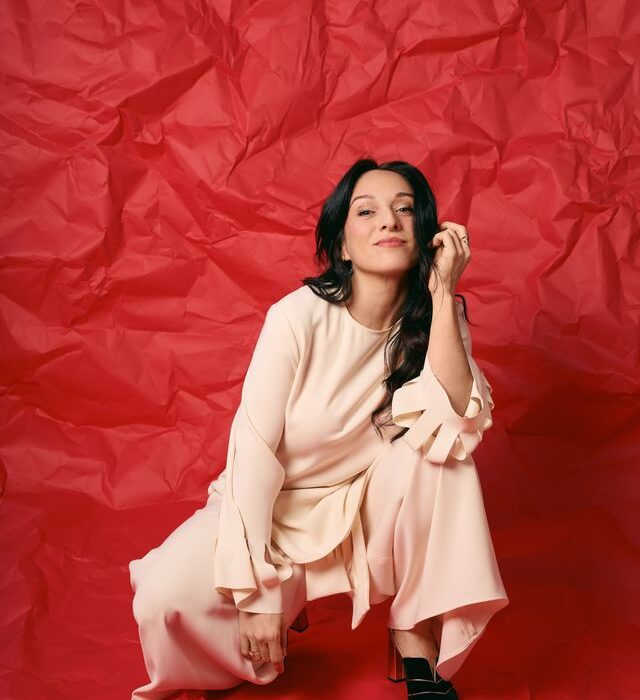
Seeing Through – Composer Ricky Ian Gordon on His Memoir
By Chris RuelIt was January 2020, on the Brooklyn waterfront. A bone-chilling wind funneled through old buildings, slamming the streets. Inside, “Ellen West” would have its premiere. But my mind wasn’t on opera; that very day, I learned my brother had cancer.
As I arrived, a cluster of people stood on the steps. Ricky Ian Gordon was in the aisle, easy to spot by his hat. I introduced myself, and “Chris!!!” burst from his lips before he hugged me. I hadn’t expected that; we’d never met before. I took my seat, and he asked to sit beside me on the aisle, mentioning he needed a quick exit after the show.
The opera unfolded, and when near the end, he quietly slipped away, reappearing onstage for the curtain call, bowing with the cast. Afterward, bundled against the cold, I said goodbye and got another hug. Gordon’s kindness struck a deep chord. A few days later, I received a DM: “Chris!!!” I figured it was about the review, which, to my critical eye, I believed was not my best, but Gordon felt differently and sent a note of thanks.
I walked away, shocked. There was no way for him to know about my brother. Yet, his kindness, openness, and joy pulled me from a dark place. Gordon had helped a fellow human, unaware of the uplifting impact of his words and actions. Read his autobiography, and you’ll understand how he developed into who he is today. Poignant, heartbreakingly honest, and no-holds-barred are excellent descriptors of the narrative.
Gordon’s Request and Personal Reflections
Earlier this summer, the most recent “Chris!!!” arrived when Gordon asked if I’d read his autobiography, “Seeing Through: A Chronicle of Sex, Drugs, and Opera.” He wanted my thoughts, both formally and informally. Reading it brought back my past.
In the chapter “My Father,” Gordon writes about his dad, a tradesman like mine. He describes a scene I know very well: “One frequent test was sending you into the garage, his domain, stuffed to the gills with tools and all kinds of greasy smelly things, and asking you to bring something back, usually something you’d never be able to identify but would dare ask for further information. ‘Go get me the monkey wrench.’ …After being unable to find anything looking remotely like a monkey, you’d go back empty-handed for the same humiliation repeatedly.” I felt seen. I’d been there, done that.
Gordon’s book reveals his days, the people he met, the music he loved, and losing many friends and acquaintances to AIDS, including the man he loved, Jeffrey. Each chapter of “Seeing Through” offers a glimpse into Gordon’s world. His mother, a former Borscht Belt singer and comedienne, gave up her career, which embittered her, filled her with sadness, and sparked her temper. Gordon recalls, “But my mother could also explode like the top off a pressure cooker. Then, she was the furthest thing from funny you could possibly imagine. These episodes involved smashing plates, running away from home, or sobbing hysterically, and they were almost always about having given up her singing career, or having four children with no help, or her marriage to a maniac.”
The Journey of Writing and Composing
“Seeing Through” was Gordon’s first book, and there was a steep learning curve. He admits, “I’ve never written a book. So I was like, oh, I had no idea—even the format. [I was told] the lines need to be double-spaced. I’m like, what’s that? And then my writing group would talk to me about white space, and I would be like, white space? They were like, you need some space between these lines.”
Gordon took what I’d call the “On the Road (Kerouac)” approach: he banged out 800 pages, some without paragraphs—just letting thoughts and words flow. It’s now pared down to 468 pages, including front and back matter and photos. A significant portion, about half, is dedicated to his compositions.
I found the works section fascinating. “The Garden of the Finzi-Continis” (which I also reviewed) had a “difficult birth.” Problems plagued the opera in an almost endless parade, but when it finally opened, it was a success.
Regarding “Ellen West,” Gordon based the opera on a poem of the same name by Pulitzer Prize-winner, Frank Bidart. Gordon received permission from the poet, and their correspondence teaches the creative process and the back-and-forth that happens.
Bidart praises Gordon’s opera in one letter: “Ricky, you’ve done it. The opera is beautiful. Eloquent, gripping, passionate… I love the score. It’s often gorgeous.” But then, Bidart suggests some improvements for the Prologue: “Something hasn’t settled down in the Prologue. Right now, the Prologue is a little lumpy. Something stylistically doesn’t seem quite focused. …Maybe the Prologue should be shorter. We have to talk about this.” He concludes, however, with: “You’ve done it.”
Once everything was buttoned up, Bidart wrote Gordon: “The whole is a tightly strung bow aimed with great penetration.” Words such as “riveting” and “compelling” are used by Bidart.
Icebergs are often used to describe the creative process. All the audience sees is the result. They don’t see the gut-wrenching steps involved, the stops and starts, the wanting to trash the work, the battles, the preciousness. It’s all there. Gordon pulls back the curtain and shows how the opera’s made; like sausage, it’s not so pretty.
Final Reflections
Anecdotes related to productions are insightful and encouraging, whether you’re composing a score, writing a libretto, a novel, or an article. As you read his “insider” accounts, you see the ups and downs of creating an opera. Gordon’s book isn’t just a memoir; it’s a guide. It offers insights and encouragement to anyone involved in creative work, showing that the struggles behind the scenes are often as significant as the final product, whether that product is a human (Gordon) or made for the opera stage.
Gordon wrote a powerful book full of intricate details about his life, with stories that will break your heart and lift your spirits.
“Believe it or not, I was so scared for the book to come out,” Gordon related. “I thought, all of these people are going to know these things about me. For better or worse, that is exciting. I don’t have to pretend anything—I really don’t—it’s all there. You either like me or you don’t, but this is who I am. This is who I’ve been in the world, and it feels incredibly liberating.”


